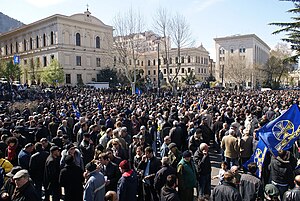This article needs to be updated. (November 2010) |
| 2009 Georgian demonstrations | |||
|---|---|---|---|
 Day 2 of demonstrations | |||
| Date | 9 April – 24 July 2009 | ||
| Location | |||
| Caused by | Election controversy Political corruption Poverty Effects of the 2008 Russo-Georgian war Human rights violations Mass incarceration | ||
| Goals | Resignation of Mikheil Saakashvili Release of political prisoners | ||
| Methods | Demonstrations, civil disobedience, road blockades | ||
| Resulted in | No policy/leadership change in response to the protests | ||
| Parties | |||
| |||
| Lead figures | |||
In 2009, a mass rally by a coalition of opposition parties took place in Georgia against the government of President Mikheil Saakashvili. Thousands of people demonstrated, mainly in the capital, Tbilisi, starting on 9 April 2009, demanding Saakashvili's resignation.[1] On the first day of demonstrations, up to 40,000 people gathered in Tbilisi.[2][3][4] Protests continued for over three months, although fewer people participated as time passed than during the first days. On 26 May 2009, the Georgian Independence Day, 60,000 protesters took part.[5] Although peaceful at first, there were incidents of fighting between the Georgian police and protesters.[6][7] The daily rallies gradually dwindled and ended, without achieving any tangible results, on 24 July –107 days after they kicked off.[8]
- ^ "Georgia set for political rallies". BBC News. 9 April 2009. Archived from the original on 11 April 2009. Retrieved 9 April 2009.
- ^ "Georgians protest into the night". BBC News. 9 April 2009. Archived from the original on 10 April 2009. Retrieved 10 April 2009.
- ^ Cite error: The named reference
rferlwas invoked but never defined (see the help page). - ^ Shields, Samantha (9 April 2009). "Georgians Plan Big Protest of President". The Wall Street Journal. Archived from the original on 11 April 2009. Retrieved 9 April 2009.
- ^ "Thousands attend Georgia protest". BBC News. 26 May 2009. Archived from the original on 28 May 2009. Retrieved 26 May 2009.
- ^ Cite error: The named reference
civilge_clashwas invoked but never defined (see the help page). - ^ Cite error: The named reference
rowswas invoked but never defined (see the help page). - ^ End of Street Protests for Now Archived 26 May 2017 at the Wayback Machine. Civil Georgia. 27 July 2009